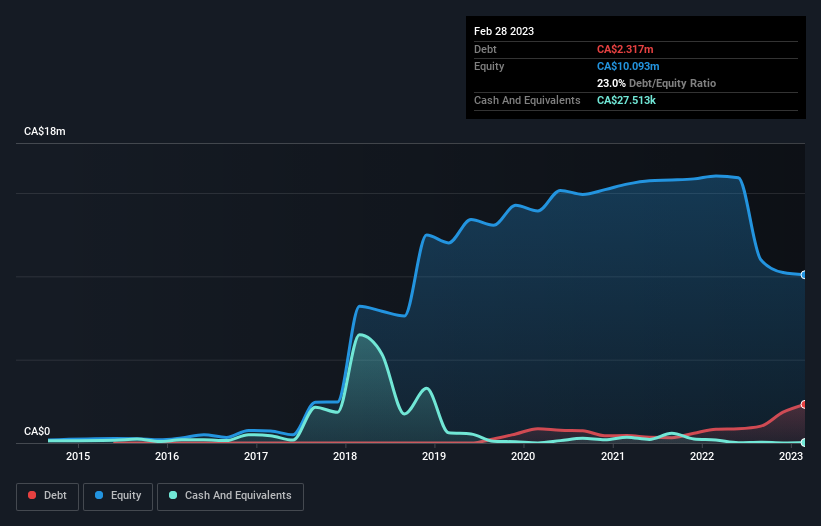Warren Buffett famously said, 'Volatility is far from synonymous with risk.' So it seems the smart money knows that debt - which is usually involved in bankruptcies - is a very important factor, when you assess how risky a company is. As with many other companies Lotus Ventures Inc. (CSE:J) makes use of debt. But should shareholders be worried about its use of debt?
What Risk Does Debt Bring?
Debt is a tool to help businesses grow, but if a business is incapable of paying off its lenders, then it exists at their mercy. Ultimately, if the company can't fulfill its legal obligations to repay debt, shareholders could walk away with nothing. While that is not too common, we often do see indebted companies permanently diluting shareholders because lenders force them to raise capital at a distressed price. Of course, plenty of companies use debt to fund growth, without any negative consequences. The first thing to do when considering how much debt a business uses is to look at its cash and debt together.
Check out our latest analysis for Lotus Ventures
What Is Lotus Ventures's Net Debt?
As you can see below, at the end of February 2023, Lotus Ventures had CA$2.32m of debt, up from CA$829.8k a year ago. Click the image for more detail. Net debt is about the same, since the it doesn't have much cash.

How Healthy Is Lotus Ventures' Balance Sheet?
Zooming in on the latest balance sheet data, we can see that Lotus Ventures had liabilities of CA$3.87m due within 12 months and no liabilities due beyond that. On the other hand, it had cash of CA$27.5k and CA$413.1k worth of receivables due within a year. So its liabilities outweigh the sum of its cash and (near-term) receivables by CA$3.43m.
This deficit is considerable relative to its market capitalization of CA$3.60m, so it does suggest shareholders should keep an eye on Lotus Ventures' use of debt. Should its lenders demand that it shore up the balance sheet, shareholders would likely face severe dilution. There's no doubt that we learn most about debt from the balance sheet. But it is Lotus Ventures's earnings that will influence how the balance sheet holds up in the future. So if you're keen to discover more about its earnings, it might be worth checking out this graph of its long term earnings trend.
In the last year Lotus Ventures had a loss before interest and tax, and actually shrunk its revenue by 52%, to CA$1.6m. That makes us nervous, to say the least.
Caveat Emptor
While Lotus Ventures's falling revenue is about as heartwarming as a wet blanket, arguably its earnings before interest and tax (EBIT) loss is even less appealing. Indeed, it lost a very considerable CA$5.6m at the EBIT level. Considering that alongside the liabilities mentioned above does not give us much confidence that company should be using so much debt. So we think its balance sheet is a little strained, though not beyond repair. Another cause for caution is that is bled CA$1.5m in negative free cash flow over the last twelve months. So in short it's a really risky stock. The balance sheet is clearly the area to focus on when you are analysing debt. But ultimately, every company can contain risks that exist outside of the balance sheet. For example, we've discovered 4 warning signs for Lotus Ventures (3 don't sit too well with us!) that you should be aware of before investing here.
If, after all that, you're more interested in a fast growing company with a rock-solid balance sheet, then check out our list of net cash growth stocks without delay.
New: AI Stock Screener & Alerts
Our new AI Stock Screener scans the market every day to uncover opportunities.
• Dividend Powerhouses (3%+ Yield)
• Undervalued Small Caps with Insider Buying
• High growth Tech and AI Companies
Or build your own from over 50 metrics.
Have feedback on this article? Concerned about the content? Get in touch with us directly. Alternatively, email editorial-team (at) simplywallst.com.
This article by Simply Wall St is general in nature. We provide commentary based on historical data and analyst forecasts only using an unbiased methodology and our articles are not intended to be financial advice. It does not constitute a recommendation to buy or sell any stock, and does not take account of your objectives, or your financial situation. We aim to bring you long-term focused analysis driven by fundamental data. Note that our analysis may not factor in the latest price-sensitive company announcements or qualitative material. Simply Wall St has no position in any stocks mentioned.
About CNSX:J
Lotus Ventures
Engages in the production, cultivation, and sale of cannabis products for medical purpose in Canada.
Medium and slightly overvalued.
Market Insights
Community Narratives



